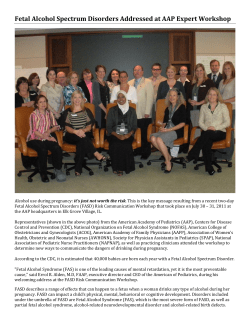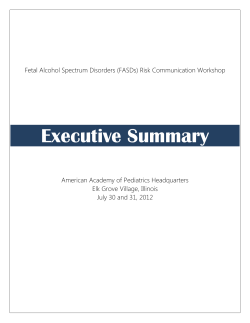
EVIDENT - Dentalkurser.dk
Is it ethical to condone low level drinking in pregnancy Janni Niclasen, psychologist, PhD Assistant professor Institute of Psychology University of Copenhagen Denmark FASD 2015, Vancouver, Canada Is it ethical to condone low level drinking in pregnancy? Overview: • • • • A few facts about Denmark Results from empirical studies looking at associations between prenatal exposure to low doses of alcohol and child development Methodological considerations Conclusion: is it ethical to condone low level drinking in pregnancy? FASD 2015, Vancouver, Canada FASD 2015, Vancouver, Canada Is it ethical to condone low level drinking in pregnancy? A few facts about Denmark: • • • • • Michael Laudrup HC Andersen Søren kierkegaard The little mermaid Lego • … And the breweries of Tuborg … and more famously Carlsberg FASD 2015, Vancouver, Canada Is it ethical to condone low level drinking in pregnancy? A few facts about Denmark • • 5.5 million people in Denmark Rated the happiest nation in the world according to the World happiness report (Helliwell, Layard, & Sachs, 2013) • • • • • Well-fare state Most people drink alcohol on a regular basis 7% of women and 3% of men are abstainers Average yearly intake: 12 litres of pure alcohol (age 16 and over) People with tertiary education drink more than those less educated • • App. 65.000 births per year Official guidelines: Are you pregnant – avoid alcohol. Are you trying to become pregnant – avoid alcohol just in case…. FASD 2015, Vancouver, Canada Is it ethical to condone low level drinking in pregnancy? Previous empirical studies looking at associations between prenatal exposure to low doses of alcohol and child development • Several studies have shown positive associations or no association between exposure to low doses of alcohol and child development including: Mental health (Kelly et al 2010), Hyperactivity/ inattention (Rodriquez et al 2009), IQ (Eriksen et al 2012), Attention (Underbjerg et al 2012), Executive functions (Skogerbo et al 2012) • Niclasen et al (JECH 2013): Prenatal exposure to alcohol, and gender differences on child mental health at age seven years • Overall, no associations were observed • Few significant associations in the opposite of expected direction for the abstaining group • An apparent protective effect was observed for the high exposure group FASD 2015, Vancouver, Canada Is it ethical to condone low level drinking in pregnancy? Previous empirical studies looking at associations between prenatal exposure to low doses of alcohol and child development • Several studies have negative associations between exposure to low doses of alcohol and child development including: externalising and aggressive behaviours (Sood et al 2001), mental health (Sayal et al 2007), IQ (Streissguth et al 1990), learning difficulties (Olson et al 1997), attention (Streissguth et al 1994, 1986) FASD 2015, Vancouver, Canada Is it ethical to condone low level drinking in pregnancy? Previous empirical studies looking at associations between prenatal exposure to low doses of alcohol and child development To sum: • • Conflicting results No dose-response associations have been established in human studies…… FASD 2015, Vancouver, Canada Is it ethical to condone low level drinking in pregnancy? • Gray and Henderson (2007): Review of the Fetal Effects of Prenatal Alcohol Exposure, conclude: No convincing evidence that prenatal exposure to low doses of alcohol is negatively associated with neurobehavioural development. However: • Many studies had methodological weaknesses • Controlled insufficiently for confounding factors • “Healthy drinker effect” FASD 2015, Vancouver, Canada Is it ethical to condone low level drinking in pregnancy? Methodology applied in the studies: • • • • Birth cohorts Prospective Large number Control for some factors (confounders) FASD 2015, Vancouver, Canada Is it ethical to condone low level drinking in pregnancy? Four possible factors that may (in part) explain the lack of consistency in the observational literature Niclasen, J. (2014). Prenatal exposure to alcohol and the developing fetus: methodological issues. BJOG, doi: 10.1111/1471-0528.13078 1. 2. 3. 4. Confounding Mediation Misclassification Outcome measures FASD 2015, Vancouver, Canada Is it ethical to condone low level drinking in pregnancy? Confounders A confounder is defined as the mixing together of the effect of an exposure with a factor that is statistically associated with the exposure and causally associated with the outcome (Porta 2008) • • • Alcohol is hypothesised to be causally associated with SDQ scores Smoking is hypothesised to be causally associated with SDQ scores and statistically associated with alcohol intake As a result, controlling for smoking will remove some of the apparent association between alcohol and SDQ scores FASD 2015, Vancouver, Canada Is it ethical to condone low level drinking in pregnancy? Confounders • • • • • • Most studies control for some factors, including maternal age, smoking, education, illicit drugs, socioeconomic status etc. Other factors are rarely controlled for including psychotropic medication, having a partner, psychiatric diagnoses, parental criminal behaviour, personality, IQ, social support, physical activity, caffeine. Also on the paternal side. Niclasen, J., (2014). Drinking or not drinking in pregnancy: the multiplicity of confounding influences. Alcohol and Alcoholism, 49(3), 349-355 Data from the Danish National Birth Cohort (DNBC) 100.000 pregnancies 1996-2002 Aim: to describe women who drink and who do not drink on a wide range of potential confounding factors FASD 2015, Vancouver, Canada Is it ethical to condone low level drinking in pregnancy? Cumulated alcohol intake (no. drinks/ full pregnancy) Alcohol Full 0 >0-10 >10-30 >30-90 >90 N 63,464 7204 19111 15054 16619 5476 Socio-demographic factors Age (M) 30.5 29.5 29.8 30.5 31.1 32.5 Age (P) 32.3 31.5 31.6 32.2 32.9 34.6 Married (no) 2.3% 3.5% 2.5% 2.1% 1.9% 2.4% Tenant (yes) 26.7% 30.6% 28.0% 26.2% 25.5% 22.8% FASD 2015, Vancouver, Canada Is it ethical to condone low level drinking in pregnancy? Cumulated alcohol intake (no. drink/ full pregnancy) Alcohol Full 0 >0-10 >10-30 >30-90 >90 N 63,464 7204 19111 15054 16619 5476 Education Mandatory (M) 8.4% 17.8% 9.3% 6.6% 5.4% 6.5% University (M) 14.6% 5.8% 11.3% 15.4% 19.2% 21.2% Mandatory (P) 13.3% 22.9% 14.8% 11.5% 9.8% 10.6% University (P) 15.3% 7.1% 12.4% 15.8% 19.6% 21.7% FASD 2015, Vancouver, Canada Is it ethical to condone low level drinking in pregnancy? Cumulated alcohol intake (no. drink/ full pregnancy) Alcohol Full 0 >0-10 >10-30 >30-90 >90 N 63,464 7204 19111 15054 16619 5476 Pre-preg. 2.9% 4.8% 3.0% 2.4% 2.4% 3.0% 1.9% 2.8% 1.9% 1.7% 1.5% 1.9% 30.3% 10.2% 22.4% 31.7% 39.8% 52.7% 3.0 0 1.4 2.8 4.6 8.3 psychiatric diagnoses (M) Pre-preg. psychiatric diagnoses (P) Binge drinking (yes) Pre-preg. alc. intake FASD 2015, Vancouver, Canada Is it ethical to condone low level drinking in pregnancy? Cumulated alcohol intake (no. drink/ full pregnancy) Alcohol Full 0 >0-10 >10-30 >30-90 >90 N 63,464 7204 19111 15054 16619 5476 63 100 62 54 50 78 Smoking (yes) 25.2% 31.5% 24.1% 23.3% 23.5% 30.9% Partner 29.6% 37.0% 29.6% 27.9% 27.1% 31.2% Lifestyle factors Cumulated smoking (cig.) smoking (yes) FASD 2015, Vancouver, Canada Is it ethical to condone low level drinking in pregnancy? Cumulated alcohol intake (no. drink/ full pregnancy) Alcohol Full 0 >0-10 >10-30 >30-90 >90 N 63,464 7204 19111 15054 16619 5476 BMI 67.6% 56.8% 64.0% 68.4% 72.8% 76.0% Cola 16.5% 24.0% 17.2% 15.0% 14.1% 15.4% TV 21.1% 29.6% 23.4% 20.1% 17.4% 15.7% Lifestyle factors FASD 2015, Vancouver, Canada Is it ethical to condone low level drinking in pregnancy? Mediation Mediation can be defined as ‘a variable that occurs in a causal pathway from a causal (independent) variable to an outcome (dependent) variable. Relevant mediators that could be controlled for: IQ on part of the child, parental mental health, home environment, violence, social support, attachment, personality FASD 2015, Vancouver, Canada Is it ethical to condone low level drinking in pregnancy? Mediation • • Mediating factors are rarely controlled for John Bowlby and attachment theory (1950s): the quality of the mother-child relationship has lasting consequences for a wide range of developmental cognitive and mental health outcomes • Possibly similar inter-group differences would be observed for the childhoodrelated mediating variables (e.g. attachment, IQ on part of the child, personality, social support) Abel (1998). Fetal alcohol abuse syndrome: “that a child’s postnatal environment affects his/ her behaviour is hardly surprising, but it has not received the attention it deserves in the present context” (p. 127) • FASD 2015, Vancouver, Canada Is it ethical to condone low level drinking in pregnancy? Misclassification Dose, timing and pattern • • • • “Dose”: how much alcohol is consumed – usually “average per week”. Larger doses, worse that smaller doses “Pattern”: Distinction between average doses and binge drinking: binge drinking worse than same amount spread over several days “Timing”: at what point in pregnancy did the consumption take place: maybe worse in third and first trimester Studies focus on one, or at best, two of these three parameters FASD 2015, Vancouver, Canada Is it ethical to condone low level drinking in pregnancy? Misclassification Reporting bias: • • • Women who drink deny: women with a high intake may be misclassified into the abstaining group Women who admit drinking do not remember correctly Women purposely under-report their alcohol intake FASD 2015, Vancouver, Canada Is it ethical to condone low level drinking in pregnancy? Outcome measures • • • • • • Many cohorts use brief questionnaires (SDQ) as outcome measures, chosen for practical reasons, not for theoretical reasons Children exposure to alcohol exhibit impairments on the performance of relative complex and novel tasks – the outcome measures may not be sensitive enough to grasp potential damage Ages for the follow-up is chosen from practical/ logistic reasons, not theoretical When the outcome is neurodevelopment the follow-up time should be theorydriven rather that practicality-driven Often the children are assessed at too early ages One study with 2600 children with FAS 50 % were found to have normal developmental scores at pre-school whereas all had severe brain dysfunction at age ten. In the same group of children 10 % were found to have attention problems at age five, whereas 60 % had attention problems at age ten (Astley (2010)). FASD 2015, Vancouver, Canada Is it ethical to condone low level drinking in pregnancy? Conclusion Is • • • • • • • it ethical to condone low level drinking in pregnancy? On the basis of the previous literature no firm conclusions can be drawn On the basis of the four methodological considerations no firm conclusion can be drawn Should we recommend abstinence or low level drinking? It might be beneficial to some women – and also to the foetuses (stress reduction) However, alcohol is a teratogen…. Quoting Garcia-Algar and colleagues (2012): “no evidence of harm does not mean evidence of no harm”. On this basis I believe that it is important that we recommend abstinence…. FASD 2015, Vancouver, Canada THANK YOU FOR YOUR ATTENTION!!! Contact: Janni Niclasen, psychologist, PhD Assistant professor Institute of Psychology University of Copenhagen Denmark janni.niclasen@psy.ku.dk
© Copyright 2025









